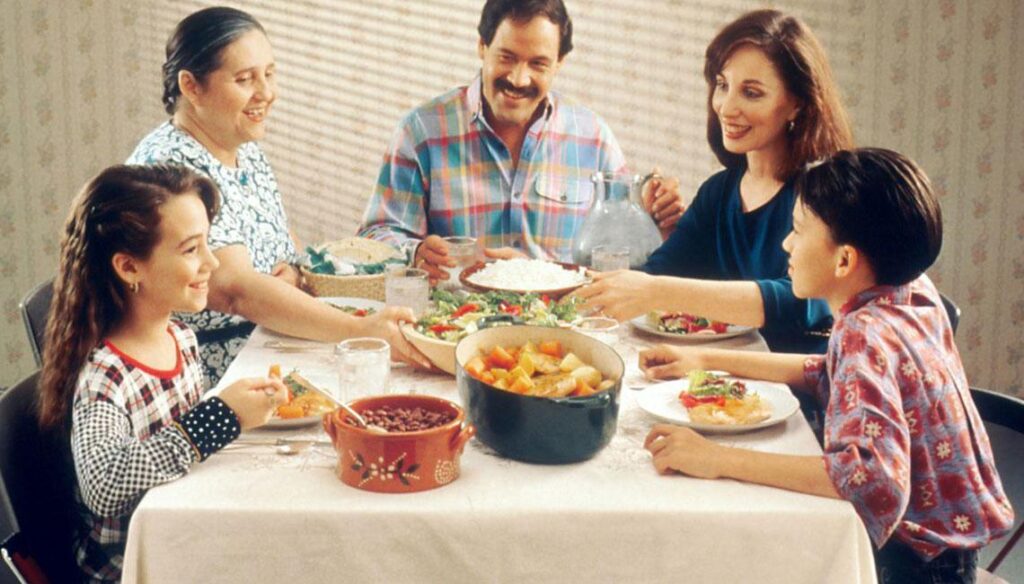
In migratory movements, food has served as an essential link between people and their homeland. It provides comfort, connection and becomes a means to express our cultural identity in an unfamiliar environment.
Food is very important because it is part of various rituals. For example, in countries like Mexico, Ecuador or Venezuela, during the Day of the Dead or All Souls’ Day, loved ones who have passed away are offered traditional foods and seasonal fruits.
Being a migrant, national dishes must adapt to the ingredients, resources and techniques available to cook them, which causes a gastronomic syncretism flooded with new aromas and flavors.
Now, although the way we eat is determined by social, cultural and geographical factors, it is largely associated with emotions. It is related to situations of joy, well-being or tranquility, although in situations of migration, it can also be related to nostalgia, sadness or mourning.
Emotional Eating: Eating to Relieve Pain
Funeral rituals
In Latin American countries, food is offered to provide comfort during funerals. It is a way to thank family, friends and acquaintances for their support in such a painful time.
Pain and feeding
Some people eat to dull the pain, while others lose their appetite during grief. The same can happen during migration. Some foods evoke emotional memories, however, others bring back sad memories. Depending on experience, they can be triggers for painful memories, such as the memory of poverty, exploration, abuse or the war situation that exists in certain countries, and that causes forced migration.
Eating disorders
We must pay attention to our behavior concerning food in the process of any type of grief because the body requires adequate nutrition and hydration to tolerate the terrible discomfort. Furthermore, high stress is usually a condition for overeating and resorting to undesirable foods, or it can cause us to reject food, resulting in eating disorders and severe illnesses.
Studies reveal that migrants have malnutrition as a risk factor due to high consumption of foods high in refined sugars and saturated fats, with the child population being the most affected. On the other hand, those who live in areas where there are mostly compatriots are more likely to eat specific foods that help counteract poor nutritional status.
Feelings of guilt
Fluctuations in body weight during grief and other circumstances can generate guilt, making eating stop being pleasurable and become an even more stressful situation. These emotional discomforts should alert us when they lead to bodily illnesses. This is the time to ask for professional medical and mental health help to manage emotions.
Food does not solve emotional problems it is a temporary reward that is insufficient. However, in-migration situations, it is an act of cultural resistance, a way of reaffirming who we are and keeping our heritage alive in the world.
However, being aware of what we eat and healthily transforming our habits will allow us to better cope with difficult times, as psychiatrist Marian Rojas Estapé explains in this video.
Important dates related to food and health
Once you understand the importance of food, its relationship with events, emotions and health effects, we offer you this additional information.
- Since October 16, 1979, World Food Day has been celebrated to raise awareness of the problems related to hunger and malnutrition in the world. In addition, it allows us to observe controversies with food production and question processes such as the use of agrochemicals or the raising of animals on farms.
- November 14 has been declared World Diabetes Day, a chronic disease that occurs when the pancreas does not produce enough insulin (a hormone that regulates the level of sugar or glucose in the blood). Its purpose is to raise awareness about the impact of this disease on people, on the economy and to highlight its prevention, diagnosis and treatment. The high mortality rates related to this disease are attributed to lifestyle and diet.
- Food also plays a crucial role in the integration of migrants into their new society. Through food, they have the opportunity to share their culture with others, fostering intercultural understanding and building bridges between diverse communities.
- As migrants explore and become familiar with local ingredients, they enrich their culinary repertoire and contribute to the gastronomic diversity of their new community.
During grief, especially in migration situations, it is very difficult to think about and attend to our own needs; however, having good nutrition helps us process our pain and heal. Traditional food is linked to our customs and it intends to make us happy so that our loved ones last in our memory and our hearts, we remind you that, at Del Pueblo Funeral Home We make difficult moments easier.
